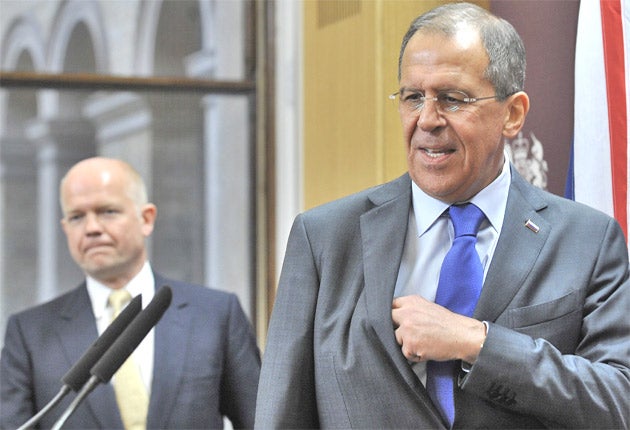Russia takes swipe at Britain – during visit to rebuild relations

Your support helps us to tell the story
From reproductive rights to climate change to Big Tech, The Independent is on the ground when the story is developing. Whether it's investigating the financials of Elon Musk's pro-Trump PAC or producing our latest documentary, 'The A Word', which shines a light on the American women fighting for reproductive rights, we know how important it is to parse out the facts from the messaging.
At such a critical moment in US history, we need reporters on the ground. Your donation allows us to keep sending journalists to speak to both sides of the story.
The Independent is trusted by Americans across the entire political spectrum. And unlike many other quality news outlets, we choose not to lock Americans out of our reporting and analysis with paywalls. We believe quality journalism should be available to everyone, paid for by those who can afford it.
Your support makes all the difference.The Russian government yesterday criticised British and US policy towards the upheavals in the Arab world as well as the nuclear stand-off with Iran, warning that rash statements from London and Washington on the issues could lead to major problems.
During a visit to London, the veteran Russian foreign minister Sergei Lavrov maintained that the West's "call for revolution" in the Middle East was "counter-productive" and a drive for "democracy of a specific pattern" in the region would backfire.
Mr Lavrov, a powerful Kremlin voice who had been the longest serving Russian foreign minister since Andrei Gromyko, used his first official visit to the UK to point out what he regarded as Western hypocrisy about democracy in the Muslim world.
The visit had been described as an attempt to rebuild relations between Britain and Russia, which have been problematic since the 2006 murder in London of former KGB officer Alexander Litvinenko. It was announced that a new "red telephone hotline" had been installed so David Cameron could communicate urgently with Russia's President Medvedev to avert any crisis. Mr Lavrov met the Prime Minister in the afternoon and was then due to take part in a whisky-tasting session in central London.
But before doing so, he was direct in his critique of Western foreign policy. Recalling how the US and its allies had pressed for elections in Gaza, forcing a reluctant Palestinian Authority to allow Hamas to run, before imposing sanctions when it won, Mr Lavrov said: "We need to understand the consequences of such encouragement. We don't think it is right to encourage specific schemes of action in terms of the Middle East states. We have had one revolution in Russia and we don't believe that we need to call for others."
Speaking through an interpreter, the Russian foreign minister also accused the US and Western European states of creating "social problems" for the people of Iran by imposing further sanctions on the country over its nuclear programme. He pointed out that the decision had been taken without the mutual agreement of the E3+3 group of Britain, France and Germany, plus the US, Russia and China – formed to negotiate with Iran and persuade Tehran to give up its ambitions of building a nuclear arsenal.
Moscow, said Mr Lavrov, would not support any further sanctions against Tehran and the problem of the nuclear issue needed to be solved through diplomatic pressure rather than threats.
He said: "It undermines our joint work in the E3+3 group. If we agree to stick to a collective agreed position, we should not deviate from that. Further sanctions would mean the creation of social problems for the population. We would not be able to support them.
"All the issues our Western partners wanted to include in the UN sanctions, but were not able to include, they imposed unilaterally. It is not in a partner-like character and we have put it openly to our British, German and French colleagues."
Join our commenting forum
Join thought-provoking conversations, follow other Independent readers and see their replies
Comments